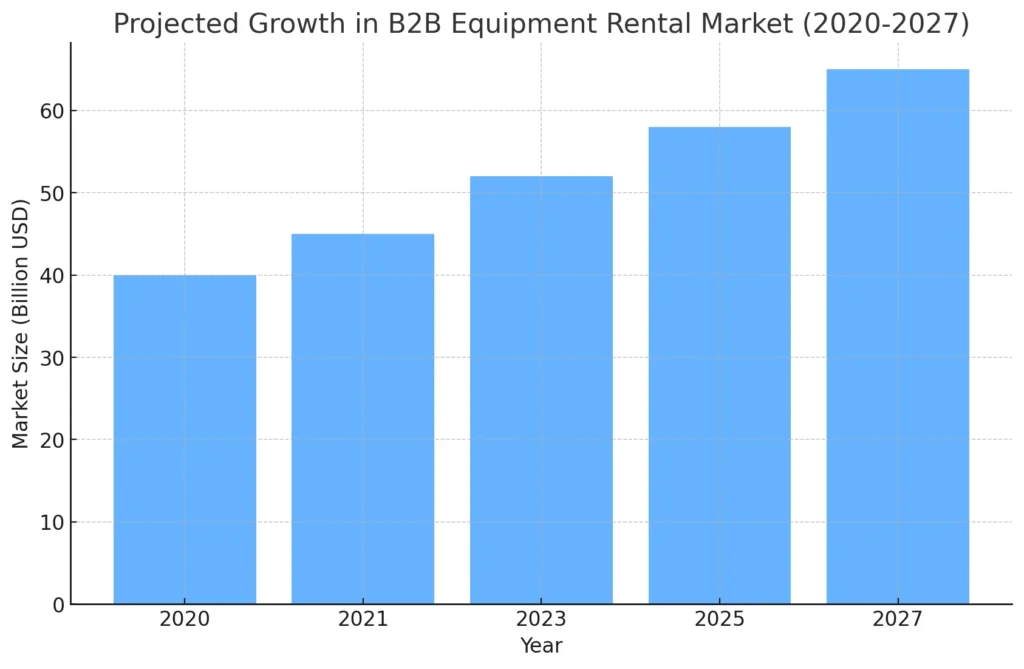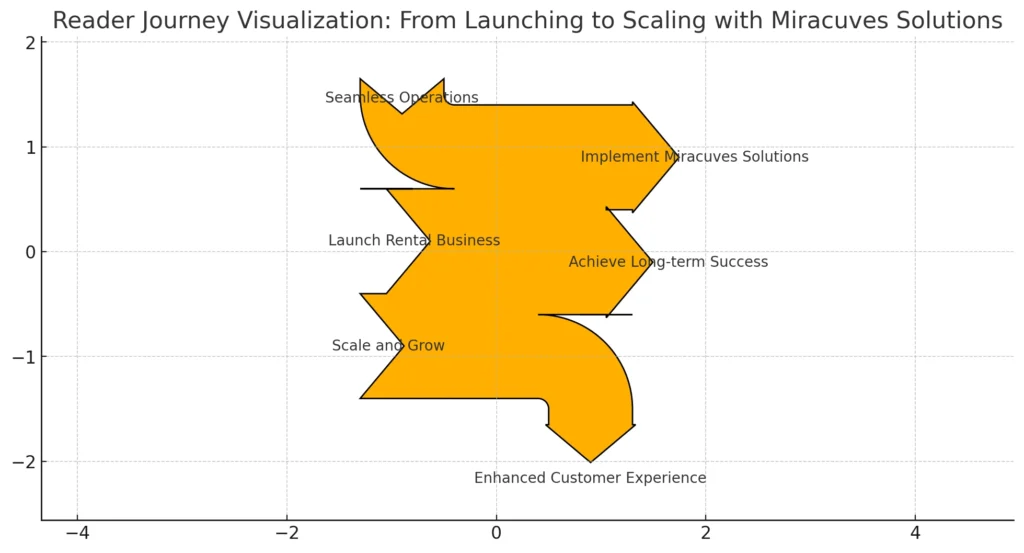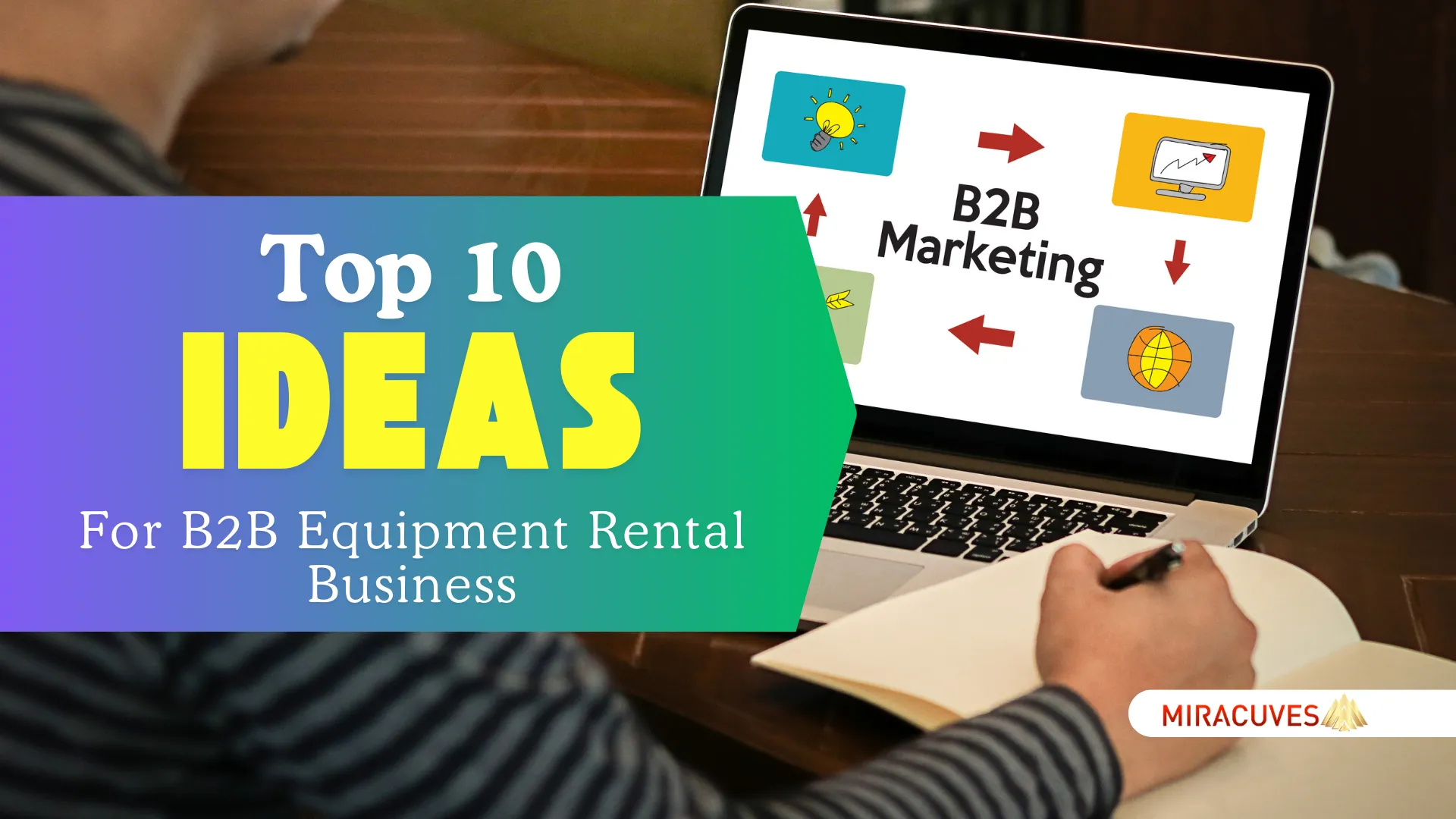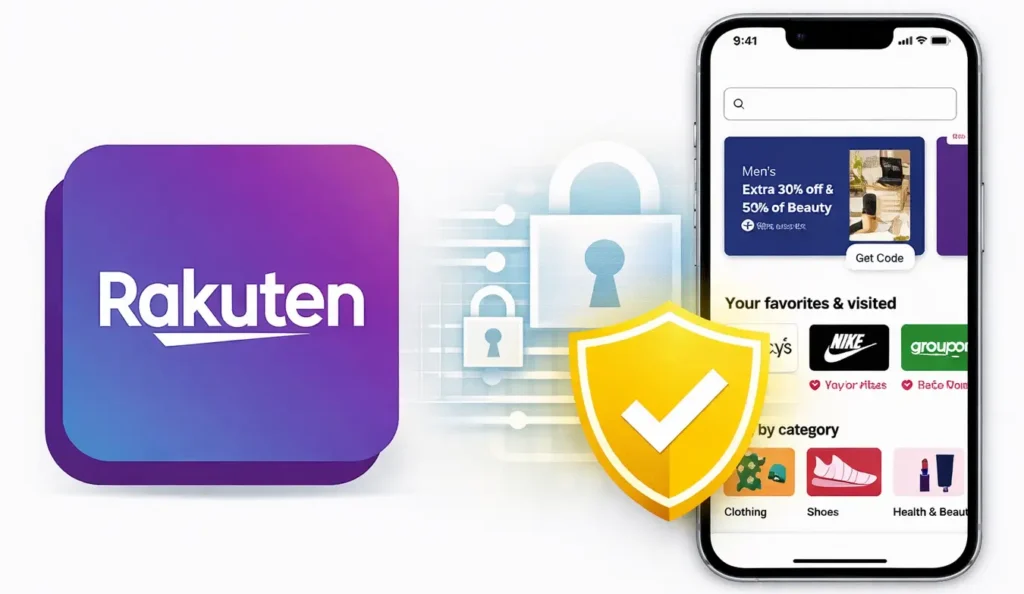In today’s fast-paced business world, the need for specialized equipment is constant, yet buying high-cost machinery often doesn’t make financial sense for many companies. This is where B2B equipment rental services come into play, providing businesses across industries with the flexibility to access essential tools and machinery without the burdens of ownership. From construction companies needing heavy-duty machines to tech firms requiring temporary IT setups, the demand for rental services is steadily growing.
The B2B equipment rental market is booming, driven by trends like digital transformation and a growing focus on sustainability. Companies now prioritize asset-light models, choosing rentals over ownership to minimize upfront investments, reduce long-term maintenance, and adapt to fluctuating project demands. Additionally, advancements in online booking and inventory management platforms make it easier than ever for rental businesses to offer smooth, customer-focused services that build long-term client relationships.
For entrepreneurs, the B2B equipment rental industry presents a wealth of opportunities across a wide range of sectors, from construction and healthcare to manufacturing and events. With various niche markets to explore and steady demand, starting a rental business can be a highly profitable venture. This article will walk you through the top 10 ideas for launching a successful B2B equipment rental business, offering insights to help you tap into this growing market.
Why Choose a B2B Equipment Rental Business?
The B2B equipment rental business offers a unique blend of profitability, flexibility, and recurring revenue potential. For many companies, renting equipment provides essential resources without the commitment and maintenance costs associated with ownership. This model is particularly appealing to industries where projects vary in size, timeline, and required equipment. Renting enables businesses to access specialized tools exactly when they need them, reducing operational costs and enhancing efficiency.

1. Steady and Recurring Revenue
B2B equipment rentals often lead to long-term contracts with clients, creating consistent income. Unlike B2C rentals, B2B clients frequently require equipment over extended periods or for repeat projects, ensuring regular cash flow. Additionally, large-scale contracts from corporations add stability to your business, making it easier to forecast revenue and plan for growth.
2. Lower Asset Turnover and High Utilization
Compared to other industries, B2B rentals generally have a lower asset turnover, meaning equipment can be used by the same client over longer durations. This reduces wear and tear and increases the utilization rate, allowing businesses to maximize profitability. With proper maintenance, rental equipment can serve multiple clients over several years, leading to a high return on investment.
3. Flexibility for Both Clients and Owners
In industries like construction, manufacturing, and events, demand for equipment fluctuates with project cycles. B2B rentals offer businesses the flexibility to rent equipment as needed, avoiding the cost of idle assets. For rental business owners, this also means the flexibility to diversify the inventory based on demand, catering to changing client needs without making permanent investments.
4. Environmental and Economic Benefits
The rental model supports sustainability by promoting equipment reuse, reducing the need for constant production of new items. This appeals to environmentally conscious businesses aiming to reduce their carbon footprint. Additionally, for companies with budget constraints, renting offers access to high-quality, often expensive equipment at a fraction of the purchase cost.
5. Digital Transformation and Easy Management
With advancements in digital platforms, managing rentals has become easier and more efficient. From online booking to automated inventory tracking, technology enables seamless operations and enhances the customer experience. By incorporating digital solutions, rental businesses can reach a broader audience and streamline processes, making B2B rentals even more attractive to both clients and owners.
Read More “How to Build an App Like PlushCare: A Step-by-Step Guide“
Current Trends and Future Opportunities in Equipment Rental
The B2B equipment rental market is evolving quickly, shaped by new technologies, shifting business preferences, and a growing focus on sustainability. These trends present exciting opportunities for rental businesses looking to meet the unique needs of modern clients.
1. Digital Platforms and Online Booking
With the rise of digital transformation, businesses increasingly prefer the convenience of online booking and real-time inventory management. Digital platforms allow clients to browse, book, and schedule deliveries of rental equipment with ease. For rental companies, these systems streamline operations, reduce administrative tasks, and improve the customer experience, expanding market reach and engagement.
2. Eco-Friendly and Sustainable Equipment
Sustainability is now a top priority for businesses across all industries. Many companies are choosing eco-friendly options, such as energy-efficient construction machinery or electric vehicles, to minimize their carbon footprint. Rental companies that provide sustainable equipment options can attract environmentally conscious clients and cater to businesses with green initiatives, positioning themselves as leaders in responsible equipment sourcing.
3. Flexible and Subscription-Based Models
Flexible rental terms, such as daily, weekly, or monthly options, allow clients to select a rental duration that fits their project needs. Subscription-based rental models are also gaining popularity, where clients can subscribe to regular access to specific equipment types. These models foster client loyalty, generate recurring revenue, and reduce downtime for rented equipment, benefiting both parties.
4. Specialized Equipment for Niche Markets
Niche industries, like drone technology for agriculture or specialized healthcare devices, often need unique equipment that isn’t required frequently enough to justify a purchase. Rental businesses that cater to specific sectors can command premium rates by providing specialized equipment to meet targeted needs. This strategy allows rental companies to stand out in the market and cultivate long-term relationships within niche industries.
5. Automation and IoT-Enabled Equipment
The adoption of automated and IoT-enabled equipment is on the rise, especially in industries like construction and manufacturing. Equipment with IoT capabilities provides valuable data, such as usage patterns, maintenance alerts, and location tracking. Rental companies benefit from reduced maintenance costs and optimized usage, while clients gain greater efficiency and transparency, creating a win-win scenario.
With the rapid shift towards digital platforms, businesses are increasingly adopting online solutions for easy booking and streamlined inventory management. These platforms allow rental companies to offer clients a seamless experience from browsing equipment to scheduling rentals, all through a convenient online interface. Embracing digital transformation helps rental businesses stay competitive and responsive to client needs.
| Trend | Impact on Market | Opportunity for Rental Companies |
|---|---|---|
| Digital Platforms and Online Booking | Expands client reach and convenience | Invest in digital solutions for seamless booking |
| Eco-Friendly Equipment | Attracts sustainability-focused clients | Provide energy-efficient and eco-friendly options |
| Flexible Rental Models | Increases client loyalty and retention | Offer subscription-based rental plans |
| Specialized Equipment for Niche Markets | Commands higher rental rates | Cater to niche industries with specific needs |
| Automation and IoT-Enabled Equipment | Optimizes equipment usage and maintenance | Offer smart equipment to improve client efficiency |
Top 10 Ideas for B2B Equipment Rental Business Startups
| Business Idea | Startup Cost Range | Target Market | Profit Potential |
|---|---|---|---|
| Construction Equipment Rental | High | Construction companies | High |
| Medical Equipment Rental | Medium to High | Healthcare facilities | Moderate to High |
| Office and IT Equipment Rental | Medium | Corporates and remote teams | Moderate |
| Event Equipment Rental | Medium | Event organizers | High |
| Agricultural Equipment Rental | High | Farmers and agricultural businesses | High |
| AV Production Equipment Rental | Medium to High | Media and production companies | High |
| Cleaning Equipment Rental | Medium | Commercial cleaning services | Moderate |
| Warehouse Equipment Rental | High | Warehouses and logistics centers | High |
| Safety Equipment Rental | Low to Medium | Industrial sites, event organizers | Moderate |
| Renewable Energy Equipment Rental | High | Sustainable projects and businesses | Moderate to High |
Reda More “Top 10 Ideas for Virtual Event Hosting Business Startups in 2024“
1. Construction Equipment Rental
Provide essential construction tools and heavy machinery like excavators, bulldozers, and scaffolding. With constant demand in the construction industry, offering reliable equipment on flexible rental terms can be highly profitable.
- Target Market: Construction companies, contractors
- Estimated Costs: High (Heavy-duty machinery, maintenance)
2. Medical and Healthcare Equipment Rental
Rent out specialized healthcare equipment such as diagnostic machines, patient monitoring devices, and mobility aids. Many healthcare facilities prefer rentals for short-term needs or specific projects.
- Target Market: Hospitals, clinics, healthcare facilities
- Estimated Costs: Medium to High (Quality certifications and maintenance)
3. Office and IT Equipment Rental
Offer office essentials like laptops, printers, copiers, and networking hardware. Companies with remote teams or temporary offices benefit from renting IT equipment without the upfront investment.
- Target Market: Corporate offices, startups, remote teams
- Estimated Costs: Medium (IT devices, tech support)
4. Event Equipment Rental
Supply equipment needed for events, such as audio-visual systems, stages, lighting, and furniture. With many companies hosting conferences, exhibitions, and corporate events, event rentals cater to a diverse clientele.
- Target Market: Event organizers, corporate clients, marketing agencies
- Estimated Costs: Medium (Event gear and setup services)
5. Agricultural Equipment Rental
Provide equipment like tractors, plows, and irrigation systems for farming businesses. With the seasonal nature of agriculture, farmers often prefer renting to buying, making this a sustainable rental model.
- Target Market: Farmers, agricultural businesses
- Estimated Costs: High (Heavy machinery and maintenance)
6. Audio-Visual Production Equipment Rental
Offer high-end cameras, lighting, sound systems, and drones for media production companies. With the boom in digital content creation, renting AV gear can be a lucrative niche.
- Target Market: Film studios, content creators, production houses
- Estimated Costs: Medium to High (Specialized AV equipment)
7. Cleaning and Sanitation Equipment Rental
Supply industrial-grade cleaning machines, such as steam cleaners, floor scrubbers, and sanitizing equipment. With increased awareness of hygiene, businesses in various industries are looking for effective cleaning solutions.
- Target Market: Commercial cleaning companies, hotels, factories
- Estimated Costs: Medium (Industrial cleaning machines)
8. Warehouse and Material Handling Equipment Rental
Provide forklifts, pallet jacks, and conveyor systems for warehouses and logistics centers. With the rise in e-commerce, there is a steady demand for material handling equipment.
- Target Market: Warehouses, logistics companies, e-commerce businesses
- Estimated Costs: High (Heavy-duty equipment)
9. Safety and Protective Equipment Rental
Offer safety gear such as helmets, gloves, protective eyewear, and harnesses for industries where employee safety is a top priority. Many companies choose rentals to maintain compliance without stockpiling equipment.
- Target Market: Construction sites, factories, event organizers
- Estimated Costs: Low to Medium (Safety gear)
10. Renewable Energy Equipment Rental
Supply solar panels, wind turbines, and battery storage systems for companies experimenting with green energy. This emerging field is appealing to companies aiming to cut energy costs and minimize environmental impact.
- Target Market: Sustainable businesses, construction sites, event organizers
- Estimated Costs: High (Renewable energy technology and setup)
Real-World Examples
| Business Model | Success Rate (%) | Common Challenges |
|---|---|---|
| Construction Equipment Rental | 85% | Managing equipment maintenance |
| Office and IT Equipment Rental | 80% | Staying updated with latest tech |
| Medical Equipment Rental | 78% | Ensuring equipment compliance |
| Event Equipment Rental | 82% | Handling logistics and timely delivery |
| Agricultural Equipment Rental | 76% | Seasonal demand fluctuations |
Successful B2B equipment rental businesses show how strategic focus and specialization can create profitable and enduring ventures. Here are some examples of how companies have capitalized on industry-specific rental needs to build strong brands and loyal client bases.
One standout example is the construction equipment rental model. Companies offering heavy machinery rentals have found success by catering to construction firms that need reliable tools for short-term projects. By providing well-maintained equipment and flexible rental terms, they ensure clients can complete projects efficiently without the high cost of ownership.
Office and IT equipment rental services have also carved out a profitable niche. With the rise of remote work and flexible office arrangements, many companies choose to rent laptops, printers, and other IT essentials. By focusing on timely delivery, tech support, and scalable solutions, these rental services have become indispensable to growing businesses and startups.
In the medical equipment rental space, companies providing temporary access to diagnostic machines, patient monitoring systems, and mobility aids have tapped into the healthcare sector’s need for cost-effective solutions. Hospitals and clinics benefit from renting specialized equipment for short-term needs, helping them manage budgets without compromising patient care.
Event equipment rental businesses have gained traction by catering to corporate clients, organizers, and marketers hosting large-scale events, conferences, and exhibitions. These companies offer everything from audio-visual systems to staging equipment, allowing event organizers to put together professional events without significant upfront costs. Flexibility, quality, and reliability are key factors that have driven success in this field.
Agricultural equipment rental businesses have found a stable market among farmers and agricultural companies. By offering seasonal access to essential machinery like tractors and irrigation systems, these businesses help farmers stay productive without making large capital investments. This model has proven especially effective in regions with strong agricultural industries, meeting farmers’ needs for flexible, affordable solutions.
Mistakes to Avoid When Starting a B2B Equipment Rental Business
Starting a B2B equipment rental business has great potential, but avoiding common mistakes can make the difference between success and struggle. Knowing these pitfalls can help you establish a smooth, customer-centered operation that stands out in the market.
| Mistake | Impact | Solution |
|---|---|---|
| Overlooking Maintenance | Customer dissatisfaction, lost revenue | Set regular maintenance and quality checks |
| Ignoring Digital Solutions | Missed bookings, manual errors | Implement online booking and inventory tools |
| Not Understanding Market Demand | Idle assets, reduced income | Conduct market research and tailor inventory |
| Weak Client Relationships | Lack of repeat clients, limited growth | Prioritize customer service and communication |
| Lacking Insurance and Risk Management | Financial losses from damage/theft | Secure adequate insurance and clear contracts |
1. Overlooking Maintenance and Quality Control
One of the biggest mistakes is neglecting regular maintenance and quality checks. Clients depend on reliable equipment to complete projects on time. Faulty or poorly maintained equipment not only frustrates customers but can also lead to expensive repairs and lost business. Having a robust maintenance schedule and quality control checks will keep your equipment in prime condition, ensuring high customer satisfaction and preventing costly downtime.
2. Ignoring Digital Solutions
In today’s digital world, managing a rental business without an online booking platform or inventory management system can put you at a disadvantage. Digital tools streamline reservations, track equipment availability, and reduce manual errors. Neglecting this area can lead to missed bookings, double reservations, and inefficient tracking. Invest in software that automates and organizes operations, making it easy for clients to rent and for you to manage equipment efficiently.
3. Not Understanding Market Demand
Offering equipment that’s not in demand can lead to idle assets and lost revenue. Conduct market research to understand the needs of your target clients. If your primary market is construction, focus on heavy machinery. If you’re targeting event organizers, invest in AV equipment and staging solutions. Tailoring your inventory to meet market needs increases the chances of consistent rentals and maximizes your profits.
4. Failing to Build Strong Client Relationships
In B2B rentals, repeat clients are invaluable. Some businesses fail to foster client relationships, treating rentals as one-time transactions. By prioritizing customer service, offering flexible rental terms, and maintaining regular communication, you can build long-term partnerships. Loyal clients not only provide steady revenue but also generate positive word-of-mouth referrals.
5. Overlooking Insurance and Risk Management
Renting equipment comes with inherent risks, such as accidental damage or theft. Not having proper insurance can result in significant financial losses. Ensure you have the right insurance coverage for your equipment, and consider requiring clients to purchase insurance on high-value rentals. Clear contracts outlining terms and conditions will further protect your business from unexpected liabilities.
One common mistake in equipment rental is neglecting an efficient inventory management system. Proper inventory management helps businesses keep track of equipment status, schedule maintenance, and monitor availability, preventing double bookings or delays. By investing in a robust inventory solution, you ensure smoother operations and a more reliable service for your clients.
Why Trust Miracuves Solutions for Your Next Project?
When it comes to launching and managing a successful B2B equipment rental business, having the right technology partner is essential. Miracuves Solutions provides innovative platforms designed specifically for equipment rental companies, empowering them to streamline operations, improve customer satisfaction, and scale efficiently. With a focus on inventory management, booking systems, and customer engagement tools, Miracuves ensures that your business runs smoothly from day one.

1. Customized Inventory Management Systems
Keeping track of equipment availability, maintenance schedules, and client reservations can be overwhelming without an efficient system in place. Miracuves Solutions offers tailored inventory management platforms that allow you to track equipment status in real-time, manage bookings seamlessly, and automate maintenance reminders. This level of control minimizes errors, reduces downtime, and keeps your business running smoothly.
2. Fast and Efficient Booking Platform
In the competitive rental market, offering a convenient booking experience is crucial. Miracuves Solutions provides a user-friendly online booking platform that allows clients to browse equipment, check availability, and book rentals effortlessly. The platform is designed to be fast and reliable, ensuring your customers enjoy a smooth rental experience every time.
3. Scalable Solutions for Growing Businesses
As your business expands, so do your operational needs. Miracuves Solutions offers scalable technology that grows with your business, supporting increased client demand and a broader range of equipment. Whether you start with a few items or manage a large fleet, the platform adapts to your needs, allowing you to focus on growth without worrying about technical limitations.
4. Cost-Effective and Reliable Technology
With Miracuves Solutions, you gain access to advanced tools and platforms at only 10% of the global average cost, making it an affordable solution for startups and established businesses alike. Despite the affordability, their technology is reliable, robust, and built to handle the unique demands of the equipment rental industry.
5. Ongoing Support and Updates
The needs of the rental industry are always evolving, and staying current is essential for long-term success. Miracuves Solutions provides continuous support, ensuring your platform remains up-to-date with the latest features and functionalities. From technical assistance to feature enhancements, Miracuves is dedicated to helping your business operate at its best.
Read more: – Top 10 Ideas for Event Equipment Rental Business Startups – Complete Guide
Conclusion
The B2B equipment rental business is full of potential for entrepreneurs eager to meet the growing demand across diverse industries. From construction and healthcare to events and agriculture, companies are increasingly turning to rentals as a cost-effective, flexible solution for their equipment needs. By providing high-quality, well-maintained equipment on flexible terms, rental businesses can build long-term relationships with clients and create a steady revenue stream.
Success in the B2B equipment rental market goes beyond simply offering equipment; it requires a focus on customer satisfaction, efficient operations, and adapting to market trends. Digital platforms, sustainable equipment options, and tailored rental plans are just a few ways businesses can stand out and meet client expectations. With a strong operational foundation, a commitment to quality, and the right technology to streamline processes, your rental business can become a trusted partner for companies in need of reliable solutions.
Starting a B2B equipment rental business is not only a smart financial move but also a valuable service in today’s fast-paced, project-based economy. Now is the time to turn your entrepreneurial vision into a profitable reality by embracing the opportunities in this dynamic industry.
FAQs
What is the initial investment needed for a B2B equipment rental business?
Startup costs can vary widely based on the type of equipment you plan to rent. Basic office and IT equipment rentals may start as low as $5,000, while construction or agricultural equipment rentals could require $50,000 or more to secure high-quality assets.
Which industries have the highest demand for equipment rentals?
Industries like construction, healthcare, events, and agriculture show the highest demand for equipment rentals. Each of these sectors benefits greatly from the flexibility and cost savings of renting specialized equipment for temporary or seasonal needs.
How do I keep my rental equipment in good condition?
Regular maintenance is key. Set up a maintenance schedule, keep detailed records, and inspect equipment after each rental. This approach minimizes breakdowns and keeps equipment in top shape for future clients.
What digital tools can improve my rental business operations?
Digital booking platforms, inventory management software, and automated scheduling tools help streamline operations. These tools allow you to manage reservations, track equipment availability, and communicate with clients more efficiently.
How can I build strong relationships with clients in the B2B rental market?
Focus on providing excellent customer service, flexible rental terms, and transparent communication. Offering loyalty discounts, responding to inquiries promptly, and ensuring equipment reliability all help in building trust and repeat business.
Related Articles:








